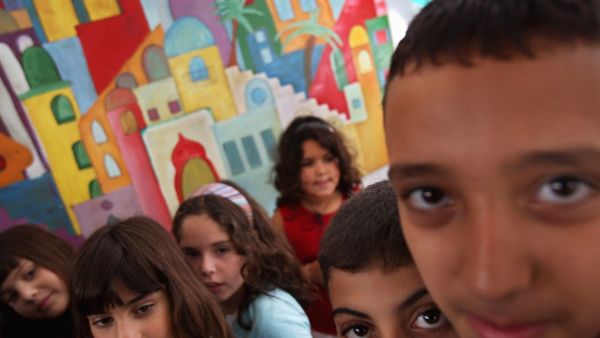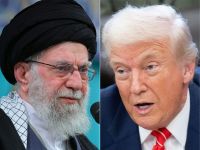"I am the president and you are the protestors in the square. Beware I am coming to kill you!” shouts Abdullah the four year old boy from Sana’a, playing make-believe with his friends.
He, like many other Yemeni children have been forced to invent new games as they can’t watch TV because of the frequent power cuts. However, the trend of children’s games has turned violent as they mimic their environment.
The most common game is having the children divide themselves into two groups – instead of the traditional game of cops and robbers, after 10 months of popular uprising, they have become pro and anti-regime protestors; the first group being the more violent.
Several Yemeni governorates have been subjected to armed conflict, disturbing the regularity of locals’ lives. News coverage and adult conversation also contributes to creating new ideas among children and they use their playtime to express themselves.
The children living near Change Square and Al-Hasaba, which witnesses regular armed conflict between tribal leaders and the state security, are some of the worst affected.
Playing with bullets
Um Ayman described how her youngest son Ayman returned home with a bunch of spent bullets he had collected from their neighborhood in Al-Hasaba.
“Instead of playing with pebbles or rocks like my other two used to when they were young, Ayman plays with bullets,” said Um Ayman in dismay. “There is a competition who collects the most and who finds other ammunition. I fear they might also find unexploded ones and get hurt.”
According to psychological expert and child specialist Dr. Bilqis Jubari, the problem is not the panic or shock alone. “It becomes worse when children adapt and violence becomes the norm,” she said.
“There are easy ways to detect signs of trauma in children, starting from aggressive behavior, a tendency to stay alone, loss of appetite or even forgetfulness and bed wetting,” said Dr. Jubari. “The good news is that it all can be helped if the parents are aware enough and they seek professional assistance.”
Apparently it affects their psyche and twists children’s perception as to what is a normal life and what isn’t, and this has an impact on their decisions and behaviors in the future.
Sa’ad Mohammed, a family man living in Sana’a, explained how one day he was returning home during a children’s pretend protest.
“I had to make my way home through lines of children who accused me of being a bultaji [thug] for breaking their protest and threw stones at me,” he said. The children enjoyed his reaction and decided to create a sit-in in their street, not allowing anyone to “break their protest.”
The words repeated on the news and in the streets have also been adopted by children. Mohammed Hassan remembered how his daughter Amal, who is only four years old, gathered some of her stuff in a plastic bag and headed for the door in a moment of rage.
“When we asked her what she was doing she said ‘ana sa arhal’ [leaving] and she said ‘I wish that when I go out a stray bullet will hit me and kill me’,” he said, adding that her words shocked him and he regretted that without him or his wife realizing, Amal had perhaps been watching the news – especially the channels that show blood and people being killed.
Even children as young as two and three years old have been affected by the conflict. Nurseen is only three years old and her mother has a problem; they live near an area where there is armed conflict and whenever the little girl heard the gunshots or shelling she got scared and started crying.
“Whenever we heard those sounds we started clapping and cheering and making all sorts of noise to distract her. Now when she hears it she does this. Maybe it is morally wrong to make her cheer whenever there is shelling but what else can I do?” asked her mother in desperation.
Teachers know
Teachers also witness these changes in the children. Liza Ali, who attends to children in a kindergarten in Sana’a, said that we as adults think that the younger ones are not paying attention or do not comprehend what is going on but they do.
“They [the kindergarten kids] see and understand more than we give them credit for. I see the impacts in their choice of games and toys as well as in their questions.”
Um Mahmoud, a teacher in a primary school, agreed and added that it is important to answer their questions as honestly as possible without shocking them because otherwise they will find answers in the wrong places.
“A student in the third grade went to the head mistress’ office and when he saw the picture of the president hanging on the wall he complained: ‘why are you hanging his picture when he kills people and is the reason why we don’t have electricity?’” she said. Eventually she managed to calm him and convinced him that it was because he is still the president today but when he leaves they will take down his picture and hang a photo of the new president.
According to SIYAJ, a child protection organization in Yemen, a child’s tendency to reflect conflict in their play is only natural – especially since children are the most observant group in society and the most vulnerable.
“It is also a consequence of the lack of adequate adult management of the tension,” said Ahmed Al-Qurashi, director of SIYAJ. “The grown-ups are often too busy worrying and coping with problems and they forget to pay attention to the little ones.”
A 2008 study by the organization on the children of conflict in the Sa’ada war, in the north of Yemen, revealed that many children were suffering from phobias, solitary behavior and sometimes wetting their beds after having nightmares.
The study showed cases of changed behavior, especially in boys, who became more aggressive towards their siblings and peers.
“It is also important to note that unless they receive some sort of treatment their suffering today will accompany them to adulthood and they are likely to be aggressive, violent adults in the future,” said Al-Qurashi. He added that history has given us so many examples of war generations in Vietnam, Palestine and Iraq and so parents and the concerned authorities should mitigate this risk as much as possible.
By Marwa Najmaldeen








